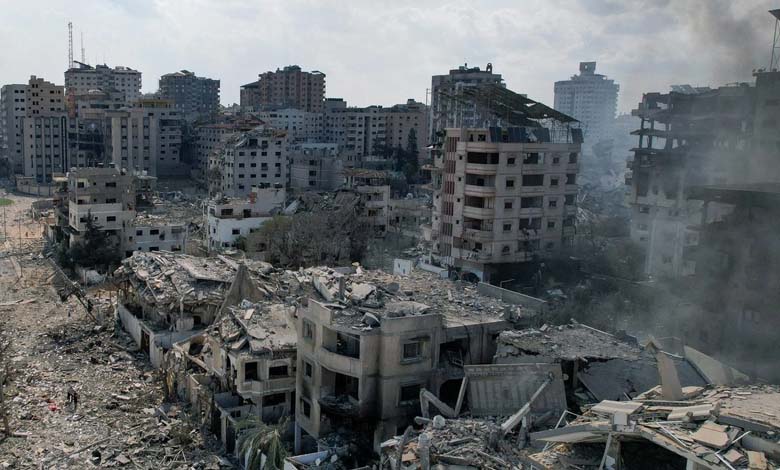Hamas seeks to assert itself as integral part of any Gaza governance equation
A Hamas leader asserts that the movement's negotiation with international parties indicates recognition, emphasizing that any party seeking to reach a conflict resolution cannot ignore it

Through the release of its latest document, which included its account of the October 7th attack on Israel, Hamas sought to address the world and attempt to position itself as part of any future equation for Palestinian territory governance.
The rare document in the realm of communication undertaken by Hamas was published in three languages: English, Arabic, and French, a few days later. It was evident that it was directed more towards the foreign audience and the international community than its own constituency.
Hamas‘s Director of International Relations, Bassem Naim, stated, “There were many spaces that the enemy tried to fill due to the absence of this document with Zionist propaganda and lies or inaccurate narratives, in an attempt to encircle the movement and demonize it at the Palestinian, regional, and international political levels. Therefore, clear responses were necessary in official documents on behalf of the movement.”
Hamas affirmed on Sunday in its 18-page document that the October 7th attack was “a necessary step and a natural response” to confront “Israeli occupation.”
The document, titled “This is our narrative… Why Storm Al-Aqsa,” added that “the Palestinian people’s battle with occupation and colonization did not begin on October 7, 2023, but well before that, 105 years of occupation: 30 years under British colonialism and 75 years of Zionist occupation.”
Hamas denied Israeli reports of targeting civilians during the attack, asserting that it only attacked military sites. However, it spoke of the possibility of a “malfunction” and “unintended matters.”
Israeli officials and citizens accused Hamas fighters of committing atrocities during the attack, including sexual assaults, random civilian killings, and torture practices.
Israel, as well as the United States, often discuss the future of Gaza post-war. While Israel indicates that Hamas will have no role in this future, often speaking of Israeli control, Americans insist that Gaza must be under Palestinian authority.
Naim stated that the movement’s work at the national leadership level “and resistance to the Zionist project qualify it to lead the Palestinian people.”
He added, “The movement does not demand through this document or others to monopolize the leadership of the Palestinian people,” but “calls for the reorganization of the Palestinian house and the reform of the Palestine Liberation Organization to represent everyone within this leadership framework.”
He noted that there are “international parties” and “major powers engaging with Hamas and its leadership and discussing with them this battle and the Palestinian national project and how to achieve it.”
He considered this to mean “recognition of Hamas” and “any party seeking to resolve this conflict cannot ignore Hamas.”
The Hamas document encourages an international investigation into what Israel is doing in Gaza and specifically calls on the United States and European countries to support this process before the international court.
Hugh Lovatt, Middle East affairs expert at the European Council on Foreign Relations, describes the document as “political propaganda.”
Ayman al-Tamimi, analyst at the Middle East Forum based in Philadelphia, believes that Hamas, by appealing to global public opinion, seeks to refute comparisons such as those made by Israel between it and groups like the Islamic State, adding “they are trying to reject the idea that they are like jihadist groups such as Al-Qaeda or the Islamic State.”
He notes that “Hamas appeals to the broader world system in a way that jihadists do not. They clearly distinguish themselves from jihadists in the way they speak.”
Andreas Krieg, security expert at King’s College London, believes, after reading Hamas‘s document, that Hamas‘s strength has changed in the aftermath of October 7th and in over 100 days of war following the attack.
He says, “If the scale is social and political control of Gaza, Hamas has certainly lost that,” but “internationally, it has largely succeeded in enhancing its position.”
He added, “I believe the issue of the Palestinian state can be more easily achieved with increased support… in the global South anyway, but also in the liberal North West.”
South Africa raised an emergency issue in the International Court of Justice against Israel, alleging that it violates the United Nations Genocide Convention. Mexico and Chile joined last week, followed by Bangladesh, Bolivia, Comoros, and Djibouti in calling for an international inquiry into the conflict.
The Hamas document calls on “the free countries of the world, especially states and peoples that were colonized or occupied (…) to take a serious and effective stand against the double standard exercised by the powers supporting Israeli occupation.”
Lovatt says the “hard reality” of the current conflict means that “any initiative to stabilize Gaza and any return of an active Palestinian authority is likely to receive some acceptance from Hamas itself,” but he also believes that “Hamas has not been defeated and will not be eliminated (…) in Gaza.”
However, the London-based expert believes that Hamas‘s narrative does not provide a convincing argument for its political rehabilitation and says, “If the movement wants to start explaining why it should not be treated as a pariah as it deserves after October 7th, it must start revealing its political vision and strategy. And this document does not serve that purpose.”












